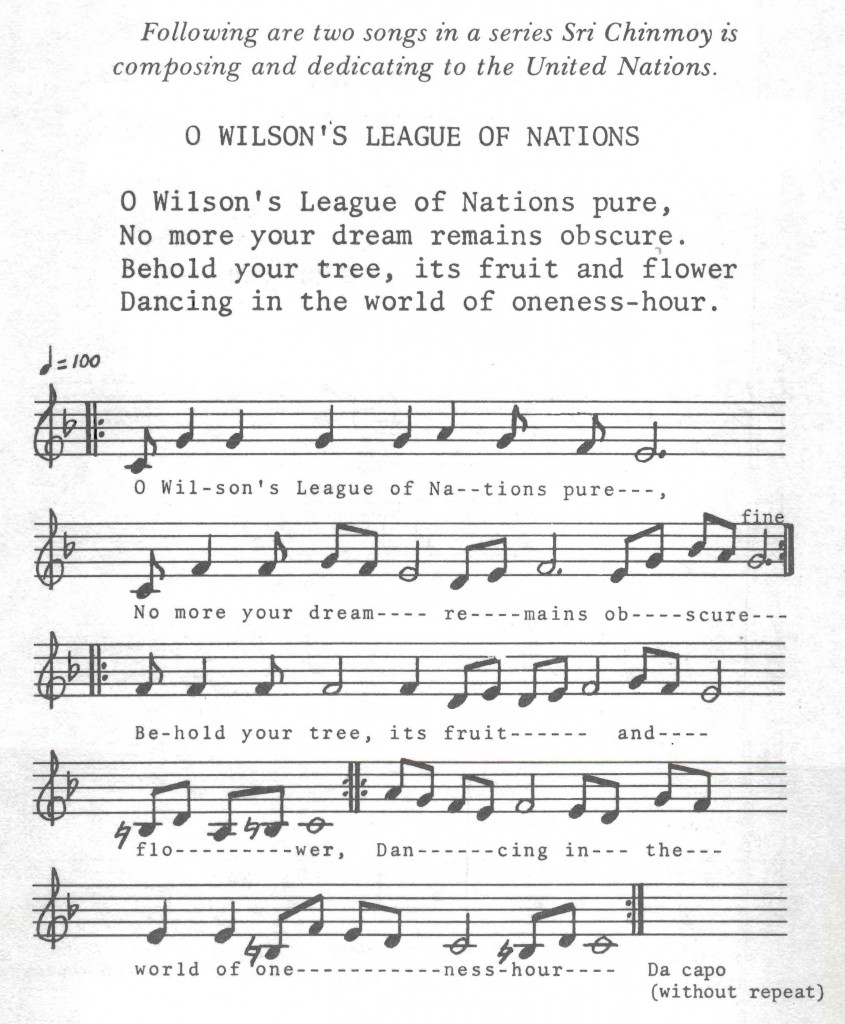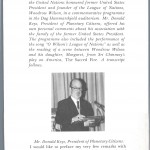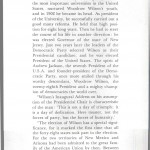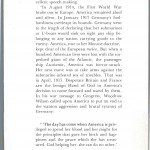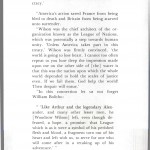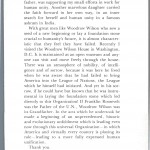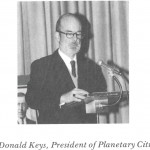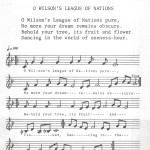Woodrow Wilson and his Dream 12 Jan 1979 combine
Filed under americas | Tributes and Expressions of appreciationcombine two entries
expand galleries -note other entry has excerpts from Sacred fire play..
Woodrow Wilson and His Dream 12 Jan 1979
Woodrow Wilson and His Dream 12 Jan 1979
On 12 January 1979 Sri Chinmoy Meditation at the United Nations honoured former United States President and founder of the League of Nations, Woodrow Wilson, in a commemorative programme in the Dag Hammarskjold auditorium.
Mr. Donald Keys, President of Planetary Citizens, offered his own personal comments about his association with the family of the former United States President.
The programme also included the performance of the song “0 Wilson s League of Nations” as well as the reading of a scene between Woodrow Wilson and his daughter, Margaret, from Sri Chinmoy’s play on America, The Sacred Fire.
A transcript follows.
TEXT below from cut and paste of ocr doc, to be cleaned up and edited, Check images for original in gallery below)
Mr. Donald Keys, President of Planetary Citizens:
I would like to preface my very few remarks with some biographical material written by the leader of the Meditation Group, Sri Chinmoy, in his book America in Her Depths.
“Ever-memorable is the name of Woodrow Wilson. He was born in Virginia in 1856, the son of a Presbyterian minister. “Princeton University of New Jersey, one of the most important universities in the United States, nurtured Woodrow Wilson’s youth, and in 1902 he became its head. As president of the University, he successfully carried out a good many reforms. He held that high position for eight long years. Then he had to steer the course of his life in another direction: he was elected Governor of the state of New Jersey. Just two years later the leaders of the Democratic Party selected Wilson as their Presidential candidate, and he was elected President of the United States. The spirit of Andrew Jackson, the seventh President of the U.S.A. and founder-president of the Democratic Party, once more smiled through his worthy descendant, Woodrow Wilson, the twenty-eighth President and a mighty champ-ion of democracies the world over. “Wilson’s Inaugural Address on his assumption of the Presidential Chair is characteristic of the man: ‘This is not a day of triumph; it is a day of dedication. Here muster, not the forces of party, but the forces of humanity.’ “The election of Wilson has a special significance, for it marked the first time that all the forty-eight states took part in the election. For the two territories of New Mexico and Arizona had been admitted to the great family of the American Union by then. Between 1789 and 1912 the original thirteen states had increased to forty-eight and the population of four million to ninety-five million.
“A notable feature: Wilson was the only President to deliver his own messages. The messages of his predecessors had been read out by somebody else. He had the gift of excellent speech-making. “In August 1914, the First World War broke out in Europe. America remained aloof and silent. In January 1917 Germany’s fool-hardiness over-leapt its bounds. Germany went to the length of declaring that her submarines or U-boats would sink on sight any ship be-longing to any nation carrying goods to the enemy. America, true to her Monroe doctrine, kept clear of the European melee. But when a hundred American lives were lost with the torpedoed giant of the Atlantic, the passenger ship Lusitania, America was horror-struck. Her next move was to take arms against the submarine-infested sea of troubles. That was in April, 1917. Desperate Britain and France saw the benign Hand of God in America’s decision to come forward and stand by them. In his war message to Congress, Woodrow Wilson called upon America to put an end to the wanton aggression and brutal tyranny of Germany: ” ‘The day has come when America is privileged to spend her blood and her might for the principles that gave her birth and happiness and the peace which she has treasured. God helping her, she can do no other.’ 11
12 ” Further, the trut h of h is {iemocratic heart cried out: ” ‘The world must be mad e safe for dem o -cracy.’ “America’s action saved Fran ce from being bled to death and Britain from being starved unto surrender. “Wilson was the chief architect of the or-ganization known as the League of Nations, which was potentia lly a step towards human unity. ‘Unless America takes part in this treaty,’ Wilson was firmly convinced, ‘the world is going to lose heart. I cannot too often repeat to you how deep the impression made upon me on the other side of [the] water is that this was the nation upon which the whole world depended to hold the scales of justice even. If we fail them, God help the world! Then despair will ensue.’ “In this connection let us not forget William Bolitho: ” ‘Like Arthur and the legendary Alex-ander, and many other lesser men, he [Woodrow Wilson] left, even though de-feated, a hope, a promise: that League which is as it were a symbol of his perished flesh and blood, a fragment torn out of his heart and left with us, to serve for one who will come after in a retaking up of his adventure.’ ” * * *
I wasn’t privileged to know Woodrow Wilson; he died the year I was born. I had the privilege of knowing one of his daughters, Eleanor Wilson McAdoo, who, in carrying on with the faith of her father, was supporting my small efforts in work for human unity. Another marvelous daughter carried the faith forward in her own way, in an inner search for herself and human unity in a famous ashram in India. With great men like Woodrow Wilson who sow a seed of a new beginning or lay a foundation stone crucial to humanity’s future, it is almost character-istic that they feel they have failed. Recently I visited the Woodrow Wilson House in Washington, D.e. It is maintained as an open museum and any-one can visit and move freely through the house. There was an atmosphere of nobility, of intelli-gence and of sorrow, because it was here he lived when he was aware that he had failed to bring America into the League of Nations, the League which he himself had initiated. And yet in his sor-row, if he could have but known that he was instru-mental in laying the foundation stone which led directly to this Organization! If Franklin Roosevelt was the Father of the U.N., Woodrow Wilson was its Grandfather. In the acts which he undertook he made a beginning of an unprecedented, historic and evolutionary unfoldment which is leading even now through this universal Organization -in which America and virtually every country is playing its role -leading to a more fully expressed human unification. Thank you.
Consider adding inks to the sections about Wilson read at programme “reading of a scene between Woodrow Wilson and his daughter, Margaret, from Sri Chinmoy’s play on America, The Sacred Fire.”
Gallery:
- bu-scpmaun-1979-01-27-vol-07-n-01-jan_Page_11.jp
- bu-scpmaun-1979-01-27-vol-07-n-01-jan_Page_12.j
- bu-scpmaun-1979-01-27-vol-07-n-01-jan_Page_13.jpg
- bu-scpmaun-1979-01-27-vol-07-n-01-jan_Page_14.jp
- bu-scpmaun-1979-01-27-vol-07-n-01-jan_Page_15
- bu-scpmaun-1979-01-27-vol-07-n-01-jan_Page_11-keys-planatary-citizens
- 1979-01jan-12-Woodrow-Wilson-photo-on-table-03
- 1979-01jan-12-Woodrow-Wilson-photo-on-table-02-scaled.jpg
- 1979-01jan-12-Woodrow-Wilson-prog-don-keys
- 1979-01jan-12-Woodrow-Wilson-photo-on-table-04
- 979-01-12-11-woodrow-wilson-portrait-cropped.jpg
- Shraddha



